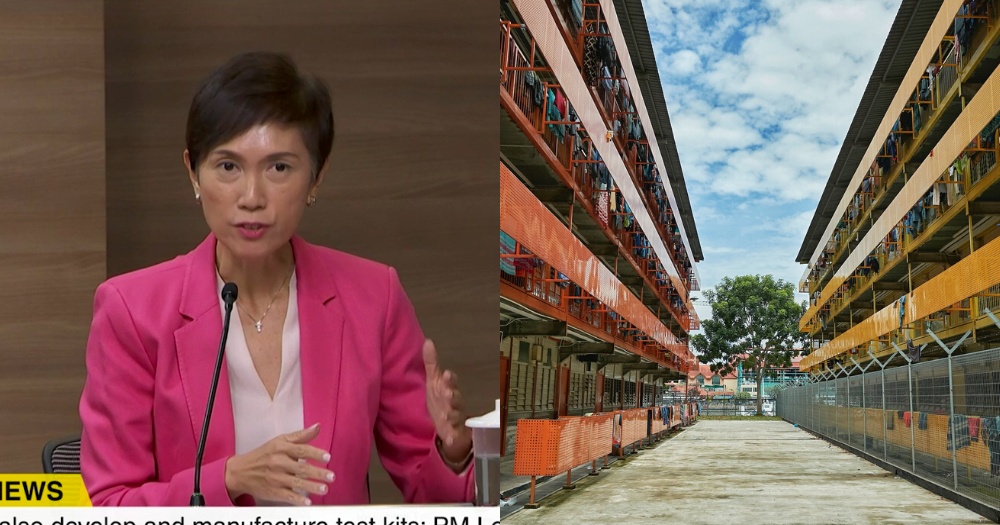Why did Singapore's authorities not move the thousands of foreign workers out of their dormitories earlier for safe distancing and to reduce interaction, and was it because of cost concerns?
That isn't at all the case — in fact, saying the government could have done so earlier "does not reflect an understanding of the workers' own concern", said Manpower Minister Josephine Teo.
She made these remarks on Tuesday (Apr. 21) at a press conference that followed a fifth address Prime Minister Lee Hsien Loong made to the nation at 5pm, where he announced the extension of Singapore's nationwide Circuit Breaker till June 1.
In his speech, he also announced further tightening measures that were expanded upon by the Multi-Ministry Taskforce, such as an odd-even system to reduce the number of people at crowded public areas like wet markets.
The Ministry of Trade and Industry also announced reductions to its essential services business list, also axing bubble tea and dessert shops:
What went wrong in the case of the foreign workers?
But of course, there has also been significant scrutiny on the alarming rise in the numbers of foreign worker Covid-19 cases, in particular among those living in dormitories here.
Minister Teo spoke about her ministry's latest directives on this, including announcing the decision to stop all movement of workers in and out of the dormitories.
This unprecedented surge in cases of foreign workers has lasted several weeks now, with the number of new daily cases averaging around 1,000 as of this week.
In light of this spike, a reporter from The Financial Times asked "what has gone wrong" in the past few weeks.
She questioned the authorities' failure to move workers out of their dormitories earlier, and asked if it might have been due to high costs associated with such a large scale operation.
"In the foreign worker dormitories case, did authorities not start moving foreign workers out of dorms earlier because it would have been hard for you to justify such a large scale operation with potentially high costs, with there being no outbreak in dorms at the time?"
"It's not about cost"
To this, Teo responded that it had nothing to do with costs — it is, in her words, about all the things that had to be done in tandem to break the transmission of illness.
She noted that since January, the government had reached out to dormitory operators to ask them to improve hygiene standards, and had supplied them with information on personal hygiene and how to protect themselves from the spread of the disease.
S11 dormitory, which has a total of 1,977 Covid-19 cases as of Apr. 20, saw an immense upgrade following the announcement of the dormitory as an isolation area, from previously appalling living conditions.
Safe distancing measures were also implemented, including the closure of non-essential facilities like TV rooms.
She said that it would not have been easy to advise workers to stop working for the sole reason of wanting to "protect" them.
"So from the workers' standpoint, this is a question of livelihood. Now to say that we could have done this much earlier, I think, really does not, you know, reflect an understanding of the workers' own concern.
It would not have been so easy to tell the workers, please don't go to work because we want to protect you. You have to do this in the context of a circuit breaker, where all work mostly has come to a stop.
We would have had to ask the workers not to cook for themselves, prepare the meals that they like at the end of the day, in order for them not to use the communal kitchens and interact with each other.
We would have had to ask the workers, please don't go out on your rest days, please stay in your rooms. Please don't interact with your friends. So it's not just a question of cost. It is also a question of what is necessary to break the transmission."
She emphasised the interaction of a range of steps including work stoppage, closing shopping areas and preventing social activity — all significant measures that greatly impact the workers' lives, livelihoods and habits:
"So it's not just a question of cost, it is also a question of what is necessary to break the transmission. So it is important for us to recognise this, and not frame this from a cost viewpoint, and as a result conclude that we didn't undertake these measures earlier only because of cost. It is not that at all.
To break the transmission, you really need a whole host of other things to happen — work stoppages, closing shopping areas, preventing people from socialising with one another. It goes well beyond cost."
You can watch the snippet from the press conference here.
Top photos screenshot from press conference, courtesy of MOMIf you like what you read, follow us on Facebook, Instagram, Twitter and Telegram to get the latest updates.
